Pumagate, athletes disqualification — 6 things that hurt Nigeria at Tokyo Olympics
The Tokyo Olympic Games have come and gone, but its spectre will trail Nigeria’s sports sector for a while. While other countries were celebrating medals, Nigerians were gnashing their teeth at numerous heartbreaks. Disappointment piggybacked heartaches for the Nigerian contingent at the Games.
Not even the bronze won by Ese Brume in the long jump event, nor Blessing Oborududu’s silver medal in wrestling could overshadow the debris that floated to the surface in Tokyo.
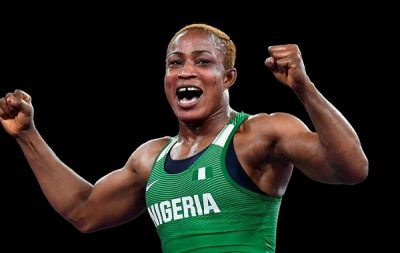
Here are six of the scandals that plagued Team Nigeria at the Games:
Disqualification of the 10 athletes
On July 28, barely a few days into the Olympics, the Athletics Integrity Unit (AIU) disqualified 10 Nigerian track and field athletes for failing to comply with the out-of-competition testing (OCT) requirement.
AIU said Nigeria is among countries deemed to have the highest doping risk, and the athletes were expected to undergo “at least three no-notice out-of-competition tests (urine and blood) conducted no less than 3 weeks apart in the 10 months leading up to a major event”.
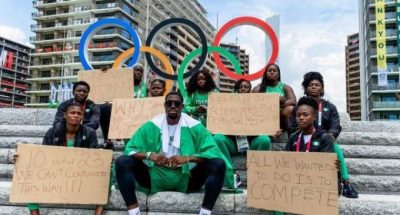
The 10 disqualified athletes fell short of the required number of tests and were thereby disqualified.
The affected athletes — Knowledge Omovoh, Ruth Usoro, Favor Ofili, Rosemary Chukwuma, Glory Patrick, Yinka Ajayi, Tima Godbless, Chidi Okezie, Chioma Onyekwere and Annette Echikunwoke — later took to the streets of Tokyo to protest the disqualification caused by the incompetence of Nigerian authorities.
Samsung saga
According to PUNCH, a source close to Team Nigeria revealed that some Nigeria Olympics Committee (NOC) officials refused to give the disqualified athletes the Samsung phones that were due to them. The Samsung S20+ 5G is a souvenir that must be presented to all athletes taking part in the Olympics.
The source claimed that some officials of NOC collected all the phones for Team Nigeria but refused to distribute them to some of the athletes.
However, the phones were later given to the affected athletes hours after the alarm was raised.
Explaining the situation, Femi Adetula, NOC spokesman, said the body was only following the terms and conditions for the phones as stipulated by International Olympics Committee (IOC).
He said the athletes were later given the phones because IOC permitted them waivers.
“The International Olympic Committee has finally granted the request of Team Nigeria for her 10 athletes who were declared ineligible to partake in the Tokyo 2020 Olympics to receive Samsung Galaxy S21 5G given to all athletes who qualified and are resident at the Olympic Village,” a NOC statement had read.
Okagbare’s suspension for failing a drug test
Nigerians were in utter shock when it was revealed that Blessing Okagbare had failed a drug test and therefore suspended indefinitely.
The country had watched her dip 11.05 seconds to finish first in heat 6 to qualify for the women’s 100 meters semi-final.
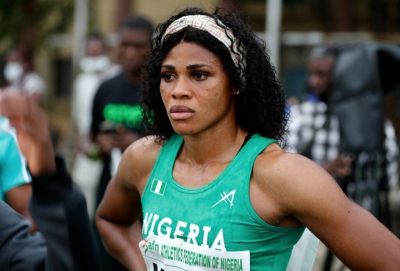 AIU said Okagbare had tested positive for human growth hormone in one of the out-of-competition drug examinations she did on July 19.
AIU said Okagbare had tested positive for human growth hormone in one of the out-of-competition drug examinations she did on July 19.
With her suspension, Nigeria’s hope of getting a medal at the sprint event diminished to a twinkle.
Athletes allowance ‘underpaid’
Aruna Quadri, Team Nigeria’s flagbearer and captain, took to his Instagram page to lambast officials for “cheating” the athletes.
In the now-deleted post, he accused some officials of short-changing athletes and called on Sunday Dare, minister of sports, to deal with the issue before it “will spoil all the good things you have been doing”.
Quadri, who was shockingly ousted in the third round, attributed his inability to replicate his performance in Rio 2016 to the failure of the officials to allow him travel with his proven coach.
“When you talk, you are rude. Cheating is always normal to them. No single respect for athletes. Priority is never put on athletes. Some of you [were] caught red-handed in previous games,” he wrote.
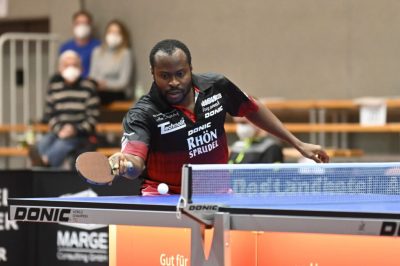
“I dare you all to remove me [from the National team] because I said the truth.
“Athletes are being short paid [underpaid], and nobody should complain?
“If the Minister of Youth and Sports Development, Sunday Dare, doesn’t come and address the athletes, these officials will spoil all the good things you have been doing.
“You all wanted me to perform well, but you removed my coach that qualified me to [who helped me to qualify for] the quarter-finals at the Rio 2016 Olympics.”
‘Wash and wear’ and ‘PumaGate’
Upon becoming the first Nigerian to qualify for the men’s shot put final at the Olympics, Chukwuebuka Enekwechi posted a video on Instagram.
In the short footage that would later go viral, he was washing his jersey ahead of the shot put final. “When you qualify for Olympic Finals, but you have only one jersey” was the caption that accompanied the post.
 The development revealed the ripple effects of the protracted leadership tussle within the Athletics Federation of Nigeria (AFN).
The development revealed the ripple effects of the protracted leadership tussle within the Athletics Federation of Nigeria (AFN).
In 2019, the AFN board under Ibrahim Gusau signed a four-year kits sponsorship contract with Puma.
A section of the deal stated that Puma would supply Nigeria’s athletics team kits for four years.
The contract also included monetary rewards for Nigerian athletes who wear the sportswear during medal presentations at the Olympic games — with gold medalists earning $15,000, silver medalists getting 5,000, while a bronze medal will attract $3,000.
However, the contract has resulted in an ongoing legal battle between the sports ministry and the factional board of AFN.
In addition, Gusau, alongside Sunday Adeleye, technical director of the body, was dragged to court by the Nigeria Police Force (NPF) for the alleged diversion of over $75,000.
Consequently, the ministry failed to allow Nigerian athletes to wear the Puma branded apparel at Tokyo Olympics, arguing that it’s “a subject of a criminal investigation”.
The developments culminated in Puma prematurely terminating the deal with the federation for alleged breach of contract.
Mike Brown sorting out accommodation when he should be training D’Tigers
Barely 48 hours after the D’Tigers were eliminated from the Games following the loss of all their three games, Chimezie Metu revealed that several “off-the-court” matters affected the team’s productivity in Tokyo.
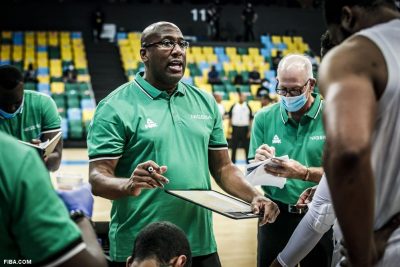
The power forward said the team “had to practice with no coach before we played the best team in the world, Australia”.
According to sources close to the team, the NOC had only made arrangements for the accreditation of three officials out of Mike Brown’s 10-man staff. This meant 7 members of the team’s technical crew wouldn’t be given access to the Games Village.
To mitigate the situation, Brown had to make hotel arrangements through the night, robbing the team of quality practice time ahead of their opening game. (The Cable)

